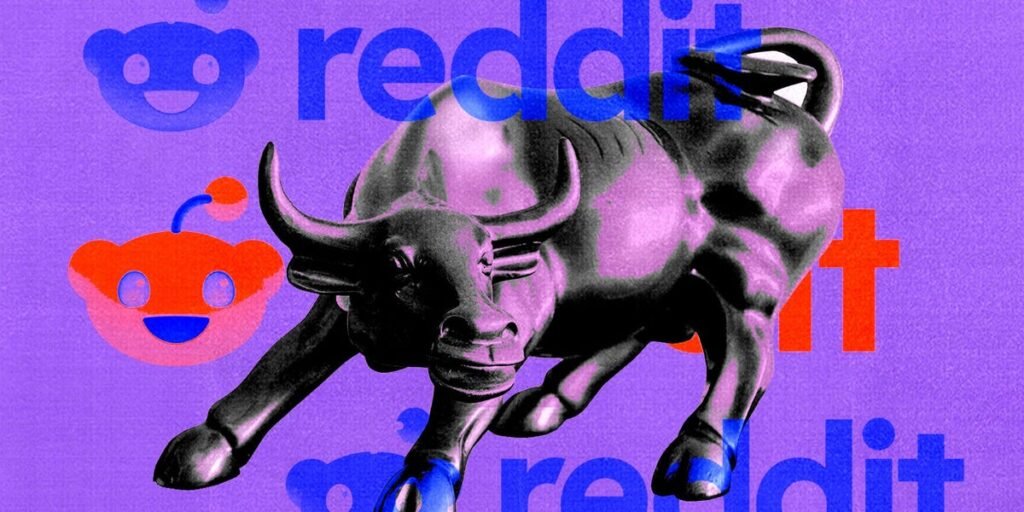- Even after many suffered huge losses in 2021, GameStop stock continues to attract day traders.
- Traders told BI that the allure of making big money in meme stocks is too great to ignore.
- Many say the recent rise has made the possibility of achieving financial freedom appealing.
GameStop shares have rebounded this year, and traders who lost big in the first round of the meme-stock boom say they are still tempted by the possibility of making big money betting on the struggling video-game retailer.
The stock is up about 43% so far this year, but was up 178% in May when the 2024 rally began.
Interest in the stock was rekindled overnight after trader Keith Gill, known on social media as “Roaring Kitty,” posted about it on X in early May and then shared a screenshot of a securities statement on Reddit showing his $116 million holding.
According to data at the end of March, Gill held 9 million shares of GameStop stock, making him the company’s fourth-largest holder.
His post broke years of silence and galvanized MemeStock followers on Reddit and other forums.
Business Insider spoke with individual traders, who asked to only use their first names to protect their privacy, about how past losses are influencing their decision to buy GameStop again.
“I drank the Kool-Aid.”
Dan, a 29-year-old retail investor who jumped into the world of meme stocks in 2021, estimates he invested about $40,000 in the company during the pandemic after seeing some promising threads about GameStop shares on the subreddit r/WallStreetBets.
The value of his holding rose to about $200,000 before the stock price fell again, and he eventually sold the shares at a loss, according to a brokerage statement seen by Business Insider.
“I noticed a lot of Reddit users, especially in the WallStreetBets community, were researching and studying GameStop and stuff, so I just kind of went down that rabbit hole,” he said of his first foray into GameStop. “Then the first crash, so to speak, happened, and it went from the $300 range down to the $100 range. Needless to say, I was very distraught. It was a devastating blow to my psyche and everything.”
Dan never thought he’d sell his shares when GameStop hit its peak: The prospect of the stock going even higher was too enticing, he said.
“I kind of drank the Kool-Aid, so to speak, of the Reddit community and the GameStop enthusiasts,” he said. “The FOMO, the fear of missing out, was so great that I didn’t even consider selling at the time, so in retrospect, it was obviously a good decision.”
Dan eventually saw a therapist to help him come to terms with his losses, but that didn’t stop him from buying more GameStop shares when the stock price soared this year.
“I’ve dabbled in the current uptrend a little bit, but it’s nowhere near where I was investing before. I’ve made a little bit, I’ve lost a little bit, so it’s pretty much a loss,” he said, adding that he was mainly drawn to the recent rally because it was “interesting.”
In search of financial freedom
Brian, another individual trader who invested in GameStop in 2020, said he too was pulled back amid this year’s Roaring Kitty-fueled rally.
“I dabbled in it when he posted it,” he told BI. “I saw all the fuss going around and saw the prices skyrocket. It was hard to resist the urge to jump in.”
The appeal of GameStop shares is the potential to make a lot of money in a short amount of time, Bryan added, saying putting money into meme stocks is like buying a lottery ticket for a chance at financial independence.
“[They] “Essentially, it gives you financial freedom; you don’t have to work,” he says. “I live in the Bay Area, California, so if you don’t have a high-paying job or you’re not in a dual-income household, it’s pretty tough here, so I was looking for something that would give me the freedom to not have to work every day.”
Others echoed similar sentiments, noting that with stock prices starting to soar, the opportunity to make big money was too enticing to just sit around and wait.
“I’ve been unemployed since November and am struggling to find work,” said Zain, another retail trader.
While he’s never traded meme stocks, he has been betting on riskier assets during the pandemic: Screenshots of his brokerage account show his portfolio ballooned to as much as $75,000 before plummeting to nearly nothing.
“You go into these stores thinking you’re going to make a little bit of money and survive,” he says, “and then it ends up snowballing and if you don’t look at yourself in the mirror, you end up losing everything.”


